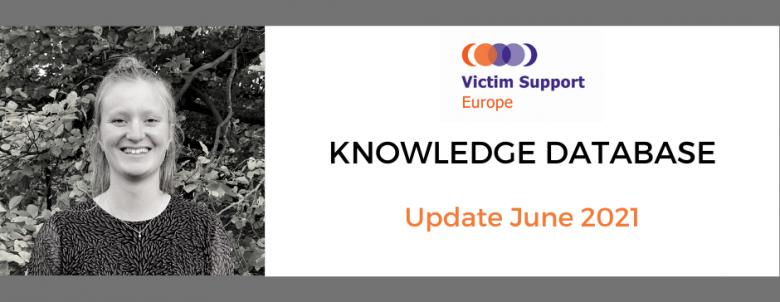
Knowledge Database – June 2021 Update
In June, the monthly update was featured by VSE’s Communications Assistant Lieselotte Van Den Heuvel. If you would like to submit publications to the Database, please reach out at vse@victimsupporteurope.eu
For this month’s contributions to our Knowledge Database, we decided to mainly focus on publications related to the topic of human trafficking. In addition to this, we are also sharing latest reports from FRA (The European Union Agency for Fundamental Rights), INVICTM (International Network Supporting Victims of Terrorism and Mass Violence), Europol and Eurojust. Let us shortly introduce the latest updates of Victim Support Europe’s database.
In the recent Special Issue of the Anti-Trafficking Review Trafficking in Minors: Confronting complex realities, structural inequalities, and agency, the legal definition of trafficking in minors, and the consequences of applying this definition, are closely analysed.
The Global Initiative Against Transnational Organised Crime published an assessment of the commercial sexual exploitation of children (CSEC) in the Western Balkans. Even though each country has the individual responsibility to respond to and prevent the spread of CSEC, a joint regional approach is required to ensure a successful and effective response. Next to an assessment, the report also provides concrete recommendations and illustrates best practice examples for the way forward.
Further, the OSCE Office of the Special Representative and Co-ordinator for Combating Trafficking in Human Beings issued a thorough research on Applying gender-sensitive approaches in combating trafficking in human beings, including several concrete recommendations on how to apply this in practise.
The International Labour Organisation publicised an extensive report on Access to protection and remedy for victims of human trafficking for the purpose of labour exploitation in Belgium and the Netherlands. This study’s great value is its emphasis on identifying existing avenues for protection and remedy also for potential victims, such as those who are not identified as human trafficking victims or have had their human trafficking victim status withdrawn. The report seeks to provide insights into how these avenues work in practice, to identify barriers that exist in accessing them and to highlight existing good or promising practices.
FRA’s latest report Encouraging hate crime reporting – The role of law enforcement and other authorities broaches the very low reporting rates of hate crimes: 9 out of 10 victims of hate crimes don’t report for several different reasons. Why do victims not report and what needs to change for them to feel motivated and safe to tackle the underreporting of hate crimes? This report attempts to answer these question and comes furthermore right in time before the European Day for Victims of Hate Crime, on July 22.
Finally, INVICTM’s report on its 2019 Symposium in Strasbourg is also out! The report focuses on meeting the needs of cross-border victims through international cooperation, both in the immediate aftermath and the long term response. Cross-border victims often face specific challenges, such as not speaking the national language, differences in culture and the distance from home. This report reflects the discussions held during the symposium and includes various practical insights and concrete solutions.
We hope you enjoyed this month’s update, however, introducing you to all the new additions in one update is nearly impossible! Please find the list of all newly added publications below and don’t hesitate to find out more in our Knowledge Database! If you would like to submit your organisation’s publications to the Database, please reach out at vse@victimsupporteurope.eu.
List of this month’s publications:
- Encouraging hate crime reporting – The role of law enforcement and other authorities
- Applying gender-sensitive approaches in combating trafficking in human beings
- Residence Permits, International Protection and Victims of Human Trafficking: Durable Solutions Grounded in International Law
- Supporting Victims of Terrorism: Report of the INVICTM Symposium Strasbourg 2019
- Access to protection and remedy for victims of human trafficking for the purpose of labour exploitation in Belgium and the Netherlands
- From vulnerability to resilience: sex workers organising to end exploitation
- Exploited In Plain Sight: An assessment of commercial sexual exploitation of children and child protection responses in the Western Balkans
- Europol – European Migrant Smuggling Centre: 5th Annual Report
- Return Mania. Mapping policies and practices in the EuroMed Region
- Eurojust Annual Report 2020
- Male Offenders of Domestic Sex Trafficking: A Multi-Case Study
- Trafficking in Minors: Confronting complex realities, structural inequalities, and agency
